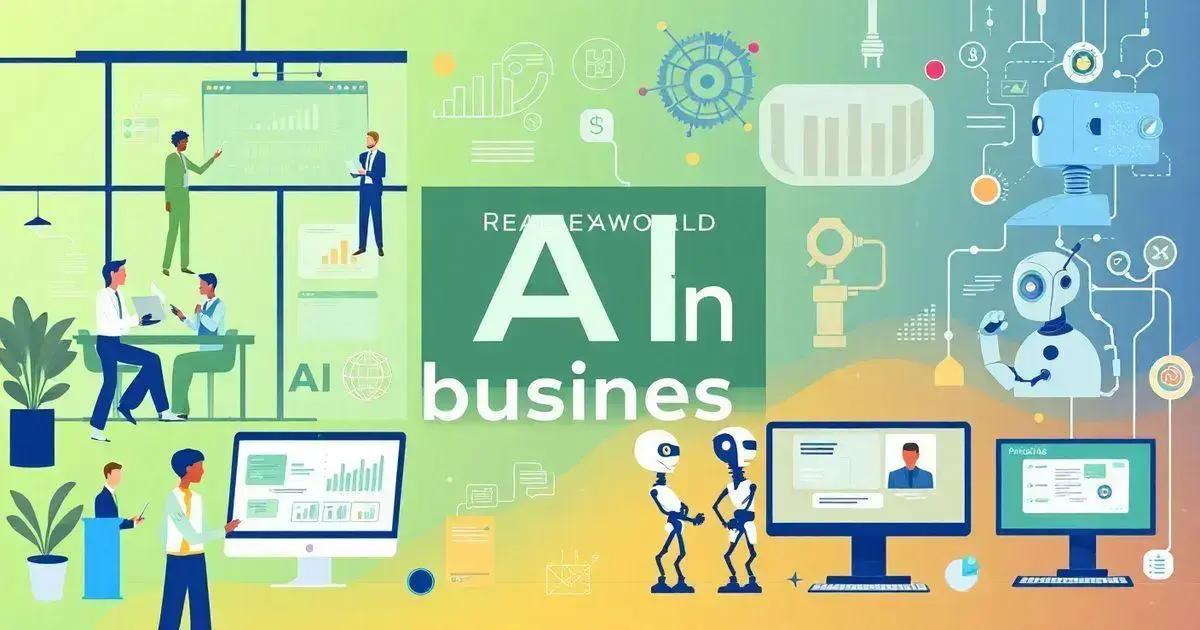AI Applications in Businesses are transforming industries by optimizing operations, fostering innovation, and elevating customer experiences. From automating mundane tasks to providing insightful analytics, AI enables organizations to work smarter and faster.
Businesses across various sectors, including healthcare, retail, and finance, are using AI to streamline processes and make data-driven decisions. These applications not only improve efficiency but also help companies stay competitive in an ever-evolving market.
To thrive in today’s business landscape, embracing AI is no longer optional—it’s essential. Discover how AI applications can redefine your business strategies and unlock new opportunities!
What are AI Applications?
AI Applications in Businesses encompass a wide range of tools and methods designed to solve problems and improve efficiency across various industries. These applications include machine learning, natural language processing, and robotics, all of which help businesses predict trends, analyze data, and enhance customer interactions.
For example, AI Applications in Businesses like machine learning enable automation by learning from data and making decisions independently. This reduces operational costs while improving accuracy. Similarly, natural language processing facilitates meaningful customer interactions by providing tailored responses through chatbots and virtual assistants.
Moreover, AI Applications in Businesses are not exclusive to large corporations. Small and medium enterprises can also leverage these technologies to optimize operations, boost productivity, and gain a competitive edge. Embracing these applications is essential for maintaining relevance in today’s dynamic business landscape.
How AI is Revolutionizing Business Operations

Artificial Intelligence (AI) is transforming business operations by streamlining processes and boosting productivity. Organizations leverage AI to analyze vast datasets, uncovering insights that were once unattainable. By automating routine tasks, AI enables employees to focus on more complex and creative endeavors, enhancing job satisfaction and overall efficiency.
For instance, AI can forecast sales trends, optimize inventory management, and elevate marketing efforts by delivering in-depth customer insights. In customer service, chatbots provide instant responses and resolve common issues, minimizing the need for human intervention.
AI systems also continuously learn and adapt to new data and trends. This capability allows businesses to become not only more efficient but also more agile in navigating changing market dynamics. Incorporating AI into business operations has evolved from an option to a necessity for sustaining a competitive edge in today’s fast-paced world.
Benefits of Implementing AI in Businesses
The benefits of implementing AI Applications in Businesses are numerous and transformative. For starters, AI can automate routine tasks, allowing employees to focus on more strategic activities. This not only boosts productivity but also enhances employee satisfaction. For example, AI Applications in Businesses can include managing schedules, processing invoices, or handling customer inquiries via chatbots.
Moreover, AI Applications in Businesses significantly improve data analysis, offering valuable insights that guide better decision-making. Through data-driven strategies, companies can predict market trends, understand consumer preferences, and customize their products or services accordingly. These insights lead to enhanced customer experiences and increased sales.
Additionally, AI optimizes operational efficiency by streamlining supply chains, predicting maintenance needs, and minimizing waste, thereby lowering costs. Over time, AI systems learn and improve, delivering even greater efficiency. By embracing these applications, businesses foster innovation and gain a competitive edge, opening new opportunities for growth and creativity.
Real-World Examples of AI in Business

The integration of Artificial Intelligence (AI) into various sectors is transforming the way businesses operate and interact with customers. AI technologies can analyze vast amounts of data, providing insights that drive decision-making and strategy.
For instance, in the retail sector, AI is used to optimize inventory management and enhance customer experiences through personalized marketing.
In healthcare, AI assists in diagnosing diseases and predicting patient outcomes, leading to improved treatment plans.
Moreover, AI-driven automation is streamlining operations, reducing costs, and increasing productivity across industries.
As AI continues to evolve, its potential to create value and drive innovation will only grow, making it essential for businesses to embrace these technologies.
Challenges in Adopting AI Technologies
Adopting AI technologies in businesses comes with several challenges that organizations must navigate.
One major challenge is the high initial investment required for implementing AI solutions. Many businesses may find it difficult to justify the costs associated with AI systems, especially for small organizations with limited budgets.
Another challenge is the lack of skilled personnel who can develop and maintain AI systems. As AI continues to grow, there is a high demand for professionals who are trained in data science and AI technologies. This skill gap can make it harder for companies to effectively implement and utilize AI solutions.
Furthermore, data privacy concerns are pivotal in AI adoption. Businesses must ensure they are compliant with regulations regarding customer data usage. This can lead to complex legal issues that require careful management.
Finally, there can be resistance to change within an organization. Employees may fear job loss or be skeptical about AI’s capabilities, leading to hesitation in embracing new technology. Therefore, it is crucial for businesses to communicate the benefits of AI clearly and involve employees in the transition process.
The Future of AI in the Business Landscape

The future of Artificial Intelligence Applications in Businesses is exceptionally promising as technology continues to evolve. AI is set to enhance efficiency and reduce costs across various industries. By automating repetitive tasks, businesses can improve productivity while enabling employees to focus on more strategic and creative roles.
In the years ahead, AI Applications in Businesses are expected to become even more sophisticated. Innovations like natural language processing will elevate customer service by enabling chatbots to handle complex inquiries. Additionally, AI-driven data analysis will offer actionable insights, empowering businesses to make informed and effective decisions.
Moreover, AI Applications in Businesses will drive innovation by identifying market gaps and suggesting new product ideas based on emerging consumer trends. Companies that effectively adopt these applications will gain a competitive edge, demonstrating agility and adaptability in a rapidly shifting market landscape.
Despite its vast potential, AI adoption comes with challenges. Ethical concerns around data privacy and job displacement must be addressed. Organizations must implement AI responsibly, ensuring it augments human capabilities rather than replacing them.
Ultimately, the future of AI in business holds transformative possibilities, reshaping industries and unlocking new opportunities for growth and innovation.
Embracing AI: A Path to Sustainable Growth and Innovation
The integration of Artificial Intelligence (AI) in businesses presents incredible opportunities for growth, efficiency, and innovation.
Companies that embrace AI can automate mundane tasks, gain valuable insights from data, and enhance customer experiences through personalised engagement.
As we move forward, it is essential for businesses to invest in AI technology thoughtfully, considering not only the financial aspects but also the ethical implications and the need for a skilled workforce.
By navigating the challenges that come with adoption and leveraging the benefits, businesses can position themselves for long-term success in a rapidly changing landscape.
